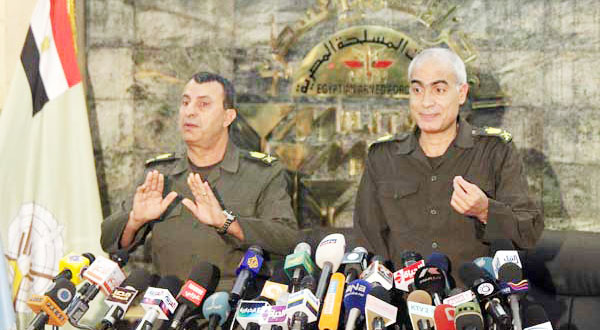 CAIRO: The emergency law will be lifted before the parliamentary elections which are scheduled for September, the Supreme Military Council of the Armed Forces said on Monday.
CAIRO: The emergency law will be lifted before the parliamentary elections which are scheduled for September, the Supreme Military Council of the Armed Forces said on Monday.
General Mamdouh Shahin, member of the council and assistant to minister of defense for legal affairs, said in a press conference that elections won’t be held under emergency laws.
Presidential elections are to be held later in the same year but no date was given at the press conference.
Shahin announced changes to the laws governing political parties, removing restrictions on establishing parties.
The principles, objectives, programs and policies of political parties shouldn’t contradict with the general principles of the constitution, according to the amendments.
One sentence that stipulated that parties based on exploiting religious sentiments can’t be established was removed from the law.
However, the part stating that political parties can’t be based on religion, race, status or class, remained as is.
Shahin described the removed sentence as “loose” and “subjective to different interpretations.”
Prominent Muslim Brotherhood leader Essam El-Erian told Daily News Egypt that the removed part wouldn’t have prevented the group from establishing a political party.
“The groups’ political party will be independent and separate from the group,” El-Erian said.
“The army promised that it wouldn’t prevent any group from establishing a political party as long as its principles were in line with the constitution,” he added.
Soon after a popular revolt that ousted president Hosni Mubarak, the MB, banned since 1954, announced plans to form a political party called the Freedom and Justice Party once laws restricting the formation of political parties were lifted.
The amendments restrict the authority of the political parties committee, which, under the leadership of the former regime, prevented the establishment of many parties, according to Shahin.
Under the amendments, the political parties’ committee must reply to the applicants’ notification for forming a new party within 30 days. If the committee fails to reply on time, the political party is considered official.
If the committee refuses the establishment of the political party based on the conditions set by the law, the committee’s decision must be presented to the Supreme Administrative Court within eight days to issue the final decision.
The committee will consist of the first vice president of the Cassation Court, two representatives from the Cassation Court, two vice presidents of the Appeals Court and two vice presidents of the State Council.
Karima Al-Hifnawy, member of the Kefaya Movement and the National Association for Change, described the amendments as “cosmetic.”
“Saying that the party shouldn’t contradict with the constitution’s principles is very loose and interpretive and could be used against political parties threatening the government,” Al-Hifnawy told DNE.
“A political party should merely notify the political parties’ committee without awaiting approval or rejection,” Al-Hifnawy said. “If there are any violations on behalf of the party, the judiciary should handle it, not the committee.”
The amendments state that a political party cannot be cancelled unless there was an investigation by the Prosecutor General, which would be later presented to and approved by the Supreme Administrative Court.
The amendments also cancel financial support given by the government to political parties.
According to Shahin, the law previously obliged the government to support each political party with LE 10,000.
“Some people used to form political parties just to take the financial support from the government without contributing to the political arena,” Shahin said.
The minimum number of members required to form a political party was increased to 5,000 members, including at least 300 members from 10 governorates, according to the amendments.
The previous law set the number at 1,000 members with at least 50 from 10 governorates, according to Shahin.
Shahin said that this condition was increased to ensure the members’ commitment to establish a political party and their popularity and representation among the Egyptian people.
“How are political parties expected to gain that much support in six months before parliamentary elections,” Al-Hifnawy said. “This condition gives leverage to the already organized, well established parties including the remaining members of the National Democratic Party (NDP) and the Brotherhood.”
The new political parties especially the youth won’t be able to establish themselves without financial support from the government, she added.
Analyst Nabil Abdel Fattah, a researcher at Al-Ahram Center for Political and Strategic Studies, agreed, saying, “The amendments haven’t done much to organize or revive Egypt’s political parties.”
Abdel Fattah suggested the number of members required to form a party be 500 from eight governorates to facilitate the procedures on new political parties and youth.
“Groups like the Muslim Brotherhood and Salafi groups will present political programs not based on religion to form their political parties,” Abdel Fatah said. “However, they will continue to implement and practice Islam in their practice as a political party, violating the law.”
“These religious groups are extremely dangerous on Egypt’s future and can turn Egypt from a civil state to a sectarian one,” he said. “There have to be strict penalties for these kinds of violations.”



